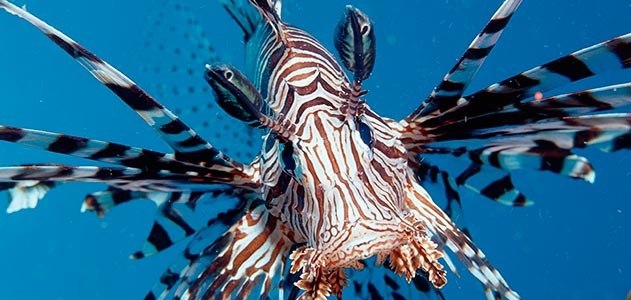
Invasion of the Caribbean waters-Lionfish, Part 1. Lionfish are known for their beauty but they are highly aggressive fish. They are the first exotic species to invade coral reefs. They have multiplied at a rate that is almost unheard of in marine history.
The local Caribbean economy depends not just on tourist dollars but on valuable food sources like grouper, shrimp, and lobster. Lionfish are damaging our reefs by eating our juvenile fish and crustaceans.
Lionfish are native to the warm tropical waters of the Indian and South Pacific Oceans, nearly 10,000 miles away from our Caribbean shores.
No one knows the exact events that brought lionfish here, but there are two possible theories:
1 – Ballast waters from ships
2 – Aquarium fish being released into Floridian waters.
The first Lionfish discovered near the Caribbean was by a crab trap fisherman, Richard Nielsen, fishing off Dania, Florida, where he caught a lionfish in October 1985.
The following report of lionfish was after hurricane Andrew (1992) when a large aquarium, reportedly on a waterfront porch above a seawall at the edge of Biscayne Bay, Florida, broke and released six red lionfish. These six lionfish were observed alive in Biscayne Bay several days later.
Genetic work shows very little genetic variation, which supports the aquarium releases as the source. Recent reports suggest the current population of lionfish originated from 8 females, again supporting a limited release.
The first study of lionfish quantities reported an average of 8.4 lionfish per acre across 17 locations in 2004. By 2009 the average was 375 per acre with a maximum of 1,125 per acre.
Recent assessments from the Bahamas show lionfish quantities are much higher than the above results (Bahamas average = 983/acre with a maximum of 1,343 per acre). These results are much higher than estimates from their native pacific ranges (5.5-200/acre) due to no natural predators in the Caribbean.
Surveys have found that introducing just a single lionfish to a reef leads to a 79 percent reduction in juvenile fish populations within five weeks. Overall, lionfish are believed to be responsible for an 80 percent reduction in the survival rates of small reef fish throughout the Caribbean.
Lionfish very quickly bulk up and develop a large body size early in their life cycle. This makes them more likely to avoid attacks by predators and increases their chances of successfully mating.
Depending on the species, lionfish live from 5 to 15 years. They grow as large as 17.7 inches.
Lionfish and why people are fascinated with their invasion.
Contact us at 1-321-777-1707 or complete this form to discuss your vacation plans.